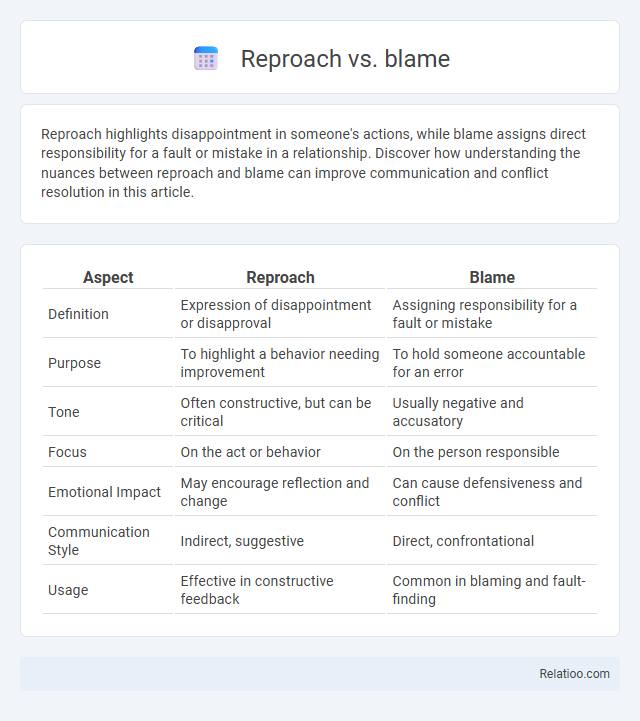Reproach highlights disappointment in someone's actions, while blame assigns direct responsibility for a fault or mistake in a relationship. Discover how understanding the nuances between reproach and blame can improve communication and conflict resolution in this article.
Table of Comparison
| Aspect | Reproach | Blame |
|---|---|---|
| Definition | Expression of disappointment or disapproval | Assigning responsibility for a fault or mistake |
| Purpose | To highlight a behavior needing improvement | To hold someone accountable for an error |
| Tone | Often constructive, but can be critical | Usually negative and accusatory |
| Focus | On the act or behavior | On the person responsible |
| Emotional Impact | May encourage reflection and change | Can cause defensiveness and conflict |
| Communication Style | Indirect, suggestive | Direct, confrontational |
| Usage | Effective in constructive feedback | Common in blaming and fault-finding |
Understanding Reproach and Blame
Reproach and blame both express disapproval but differ in intensity and focus; reproach often implies a gentler, more reflective criticism of someone's actions or character, while blame assigns responsibility for a fault or mistake, often with a stronger negative judgment. Understanding reproach involves recognizing it as a way to communicate disappointment and encourage improvement without necessarily condemning the person, whereas blame is typically used to hold someone accountable for wrongdoing. The nuanced distinction helps in conflict resolution and emotional communication by balancing feedback and accountability.
Defining Reproach: Nuances and Context
Reproach involves expressing disappointment or disapproval, often focusing on moral or ethical shortcomings, while blame attributes fault or responsibility for a specific wrong or failure. Unlike blame, reproach carries a stronger emotional tone, reflecting a personal judgment that can affect relationships and self-esteem. Your understanding of these nuances helps navigate conflicts with greater emotional intelligence and clarity.
What Does Blame Really Mean?
Blame refers to assigning responsibility for a fault or wrong, often implying accountability and fault judgment. It involves pinpointing a specific cause or individual deemed responsible for a negative outcome, emphasizing moral or legal obligation. Unlike reproach, which expresses disapproval or disappointment, blame focuses on identifying who caused an issue to hold them liable.
Key Differences Between Reproach and Blame
Reproach involves expressing disappointment or disapproval towards someone's actions, often highlighting a moral or emotional aspect, while blame assigns responsibility or fault for a mistake or wrongdoing. Unlike blame, which can carry a legal or formal implication of accountability, reproach tends to be more personal and emotional, reflecting a judgment on character or behavior. Understanding these key differences helps you communicate feedback more effectively, choosing reproach to convey sorrow or regret and blame to pinpoint cause and responsibility.
Emotional Impact: Reproach vs Blame
Reproach conveys disappointment or disapproval that often encourages reflection and growth, whereas blame tends to assign fault and provoke defensiveness or guilt. The emotional impact of reproach can foster constructive dialogue and healing, while blame frequently leads to resentment and emotional withdrawal. Understanding the nuanced difference aids in managing interpersonal conflicts with greater empathy and effectiveness.
Communication Styles: Using Reproach or Blame
Reproach in communication focuses on expressing disapproval or disappointment in someone's actions, often aiming to evoke self-reflection without direct accusation. Blame assigns responsibility for a fault or mistake, typically creating a defensive response and escalating conflict. Choosing reproach over blame promotes constructive dialogue, encouraging accountability while maintaining respect and openness in interpersonal relationships.
Cultural Perspectives on Reproach and Blame
Cultural perspectives on reproach and blame significantly influence how individuals perceive accountability and express dissatisfaction. In collectivist cultures, reproach is often indirect to preserve group harmony, while blame may be avoided publicly to maintain respect and social cohesion. Your understanding of these nuances can improve cross-cultural communication and conflict resolution by aligning responses with cultural expectations.
Real-Life Examples: Reproach in Action vs Blame
Reproach often involves expressing disappointment or disapproval, such as a parent calmly addressing a child's poor grades, whereas blame assigns fault and responsibility for a problem, like accusing a colleague of causing a project delay. In real-life scenarios, reproach tends to foster reflection and improvement, while blame can provoke defensiveness and conflict. For example, a manager using reproach might say, "I was expecting better results," encouraging growth, whereas blame would sound like, "You failed to meet the deadline," which can damage relationships.
When to Use Reproach Instead of Blame
Reproach focuses on expressing disappointment or disapproval in someone's actions, often highlighting a moral or emotional expectation, whereas blame assigns responsibility for a fault or mistake more directly. Use reproach when you want to convey a sense of regret or sadness about someone's behavior, emphasizing your emotional response rather than just fault-finding. Your choice to reproach instead of blame can foster reflection and understanding without provoking defensiveness.
Resolving Conflicts: Choosing Words Wisely
Carefully distinguishing between reproach, blame, and reproach is crucial for resolving conflicts effectively; reproach expresses disappointment without direct accusation, while blame assigns responsibility for fault, potentially escalating tensions. Using words that emphasize understanding and accountability rather than criticism fosters open communication and mutual respect. Selecting language thoughtfully minimizes defensiveness and promotes collaborative problem-solving in strained interactions.

Infographic: Reproach vs Blame
 relatioo.com
relatioo.com